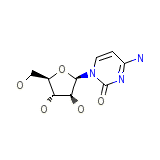Spongocytidine




Spongocytidine Brand names, Spongocytidine Analogs
- AR3
- Alexan
- Ara-C
- AraC
- Arabinocytidine
- Arabinofuranosylcytosine
- Arabinosylcytosine
- Arabitin
- Aracytidine
- Aracytin
- Aracytine
- Arafcyt
- Beta-cytosine arabinoside
- Citarabina [INN-Spanish]
- Cytarabin
- Cytarabina
- Cytarabine (JP14/USP)
- Cytarabine [USAN:BAN:INN:JAN]
- Cytarabine(USAN)
- Cytarabinoside
- Cytarabinum [INN-Latin]
- Cytarbel
- Cytosar
- Cytosar-U
- Cytosine 1-beta-D-arabinofuranoside
- Cytosine arabinofuranoside
- Cytosine arabinose
- Cytosine arabinoside
- Cytosine arabinoside (VAN)
- Cytosine beta-D-arabinoside
- Cytosine, 1-beta-D-arabinosyl-
- Cytosine, beta-D-arabinoside
- Cytosine-1-beta-D-arabinofuranoside
- Cytosine-beta-D-arabinofuranoside
- Cytosine-beta-arabinoside
- Depocyt
- Depocyt (TN)
- Depocyt (liposomal)
- Erpalfa
- Iretin
- Spongocytidine
- Tarabine
- Udicil
- beta-Arabinosylcytosine
- beta-D-Arabinosylcytosine
Spongocytidine Brand Names Mixture
- No information avaliable
Spongocytidine Chemical_Formula
C9H13N3O5
Spongocytidine RX_link
http://www.rxlist.com/cgi/generic3/cytarabine.htm
Spongocytidine fda sheet
Spongocytidine msds (material safety sheet)
Spongocytidine Synthesis Reference
Krenitski, et al; Carbohydr.Res.; 97, 139-146(1981)
Spongocytidine Molecular Weight
243.217 g/mol
Spongocytidine Melting Point
212-213oC
Spongocytidine H2O Solubility
Freely soluble
Spongocytidine State
Solid
Spongocytidine LogP
-2.712
Spongocytidine Dosage Forms
Injectable solution
Spongocytidine Indication
For the treatment of acute non-lymphocytic leukemia, acute lymphocytic leukemia and blast phase of chronic myelocytic leukemia.
Spongocytidine Pharmacology
Cytarabine is an antineoplastic anti-metabolite used in the treatment of several forms of leukemia including acute myelogenous leukemia and meningeal leukemia. Anti-metabolites masquerade as purine or pyrimidine - which become the building blocks of DNA. They prevent these substances becoming incorporated in to DNA during the "S" phase (of the cell cycle), stopping normal development and division. Cytarabine is metabolized intracellularly into its active triphosphate form (cytosine arabinoside triphosphate). This metabolite then damages DNA by multiple mechanisms, including the inhibition of alpha-DNA polymerase, inhibition of DNA repair through an effect on beta-DNA polymerase, and incorporation into DNA. The latter mechanism is probably the most important. Cytotoxicity is highly specific for the S phase of the cell cycle.
Spongocytidine Absorption
Less than 20% of the orally administered dose is absorbed from the gastrointestinal tract.
Spongocytidine side effects and Toxicity
Cytarabine syndrome may develop - it is characterized by fever, myalgia, bone pain, occasionally chest pain, maculopapular rash, conjunctivitis, and malaise.
Spongocytidine Patient Information
This medicine is a type of chemotherapy for treating cancers of the
blood and certain other cancers. This medicine interfers with the
way cancer cells grow, Take your doses on a regular scheduled time
and DO NOT take this medicine more often than directed by your health
care provider. Finish the full course prescribed by your health care
provider. DO NOT stop taking this medicine unless diredted to do so
by your health care provider. While taking this medicine, you make
get infection more easily. Call your doctor if you get a fever, chills,
or sore throat. Drink plenty of water with this medicine.
blood and certain other cancers. This medicine interfers with the
way cancer cells grow, Take your doses on a regular scheduled time
and DO NOT take this medicine more often than directed by your health
care provider. Finish the full course prescribed by your health care
provider. DO NOT stop taking this medicine unless diredted to do so
by your health care provider. While taking this medicine, you make
get infection more easily. Call your doctor if you get a fever, chills,
or sore throat. Drink plenty of water with this medicine.
Spongocytidine Organisms Affected
Humans and other mammals














